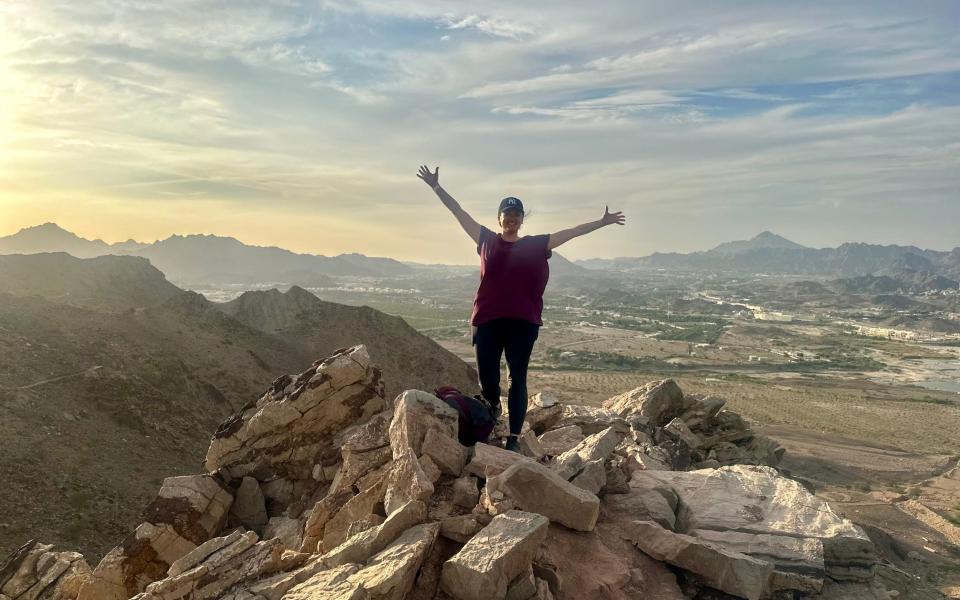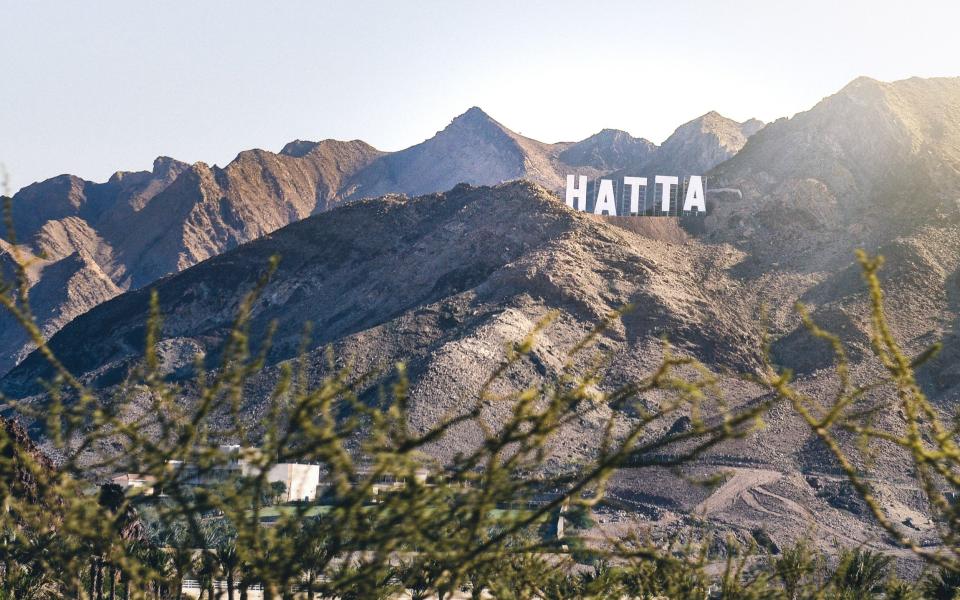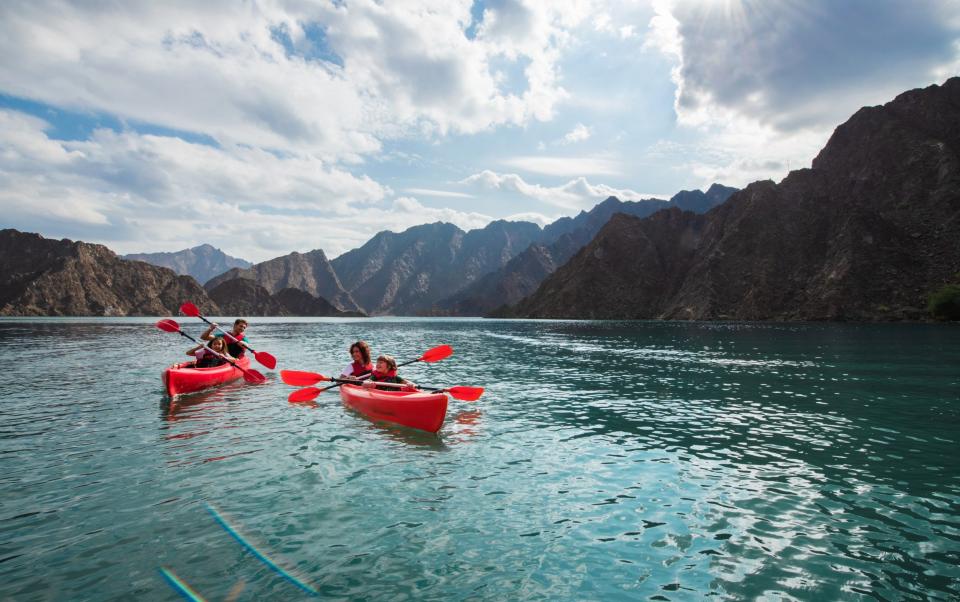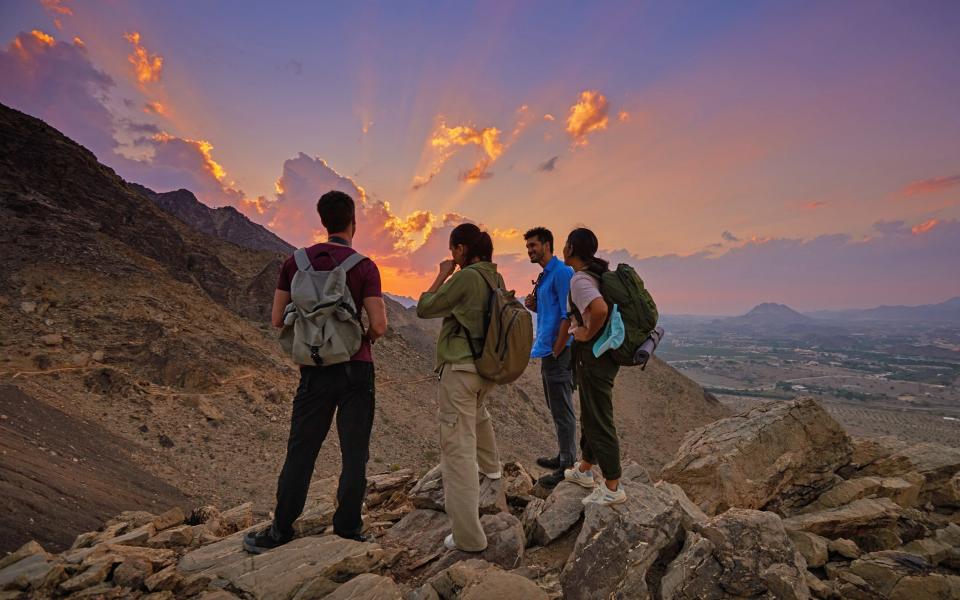Why you should ditch Dubai’s fancy hotels – and go camping instead

“I have 15,000 strawberry plants, but I’d really like a few more,” said Mr Al Mutuwaiee, grinning beneath his Armani baseball cap. But he’s not hoping for just any variety, he explained: he wants the “white jewel” strawberry, the world’s most expensive – praised for its glossy yet totally colourless flesh. However, they’re grown only in Japan, “and its export rules are… tough,” he sighed, unlocking the door to his greenhouse. “I’m trying, but no success yet. But,” he brightened, “I have hope! In Dubai, nothing is impossible.”
In his spotless kandura robe and designer headgear, Al Mutuwaiee doesn’t look like an ordinary farmer – but then again this is no ordinary farm. A huge, lustrous mango tree towers over the courtyard, providing welcome shade from the pitiless sunshine, and rows of ruby-red strawberries lead to a grove of papaya saplings, their leaves bigger than dinner plates. Behind the trees, mountains loom in every direction, the peaks as sharp as an electrocardiogram – rising up and crashing down against a cloudless sky.

Yes, this is Dubai – but not as you probably know it. In Hatta, the home of Al Mutuwaiee’s smallholding, there are no malls, no swish resorts, no 16-lane motorways. An exclave of the emirate of Dubai, the region is tiny – a touch larger than Jersey – and a two-hour drive from the city; it borders Oman to the south, and other UAE emirates to the west and north. Still, its peaks would dwarf most skyscrapers, and thanks to ongoing investment in its tourism and infrastructure to the tune of AED1.3 billion (£281 million), Hatta is certainly hot property.
Up in the Al Hajar mountain range, this is a traditionally quiet, little-visited region. It is replete with lush date plantations and family-run farms, mighty summits and secluded campsites: natural joys which, say the government, the new developments will enhance, not destroy. It’s easy to see why the location is so ripe for investment; at this altitude, it’s always a few degrees cooler than the city, with a fresh breeze, too. The signs dub it “The Highlands of Dubai”.
Dubai’s adventure playground
The region’s first major project opened in 2018: Hatta Wadi Hub, an outdoor adventure centre whose offering grows larger every year – zip-lining, mountain-biking, guided hikes, axe-throwing, high-ropes and more. Before its arrival, the only people who visited Hatta from the city were a few hardy wild campers; I know, because I was one of them. “Now, we’re building a big shooting range, and dreaming up all kinds of new activities,” enthused general manager David Charlton on my most recent visit in February. He had the vim of someone creating their ultimate playground – which, given Hatta’s extraordinary bounty, I guess he is.
Heading from Dubai city, Hatta is an easy drive eastward on a smooth desert highway. The world’s tallest building quickly shrinks in your rear-view mirror: it’s a surreal trip, the road surrounded by rusty-red sand dunes and lolloping camels. But just when you think you’ve left civilisation behind, up pops the Hatta sign: huge Hollywood-style lettering high in the hills, announcing your location in bold-type. It’s actually even bigger than Los Angeles’s icon – this is Dubai, after all.

At the Hatta Honey Bee Discovery Centre, you can don beekeeping suits to get hands-on with real working hives, and taste honey made from ghaf pollen – the UAE’s national tree. Soon, Al Mutuwaiee’s Hatta Strawberry Farm will offer pick-your-own organic fruit, plus farm tours and a coffee shop selling homemade preserves. There are endless hiking trails through the peaks, ancient tribal forts to explore, and almost 40km of graded cycling routes.
Another newbie is Hatta Kayak, a watersports base at Hatta Dam. This vast, tranquil reservoir is surrounded by mountains, its water sparkling like diamonds in the abundant sunshine. It is genuinely stunning, yours to explore by kayak, pedalo or cruise boat, with only a few elegant grey cormorants for company.
Peak-perfect camping
You’d think that, in this nation of five-star hotels, a tent wouldn’t hold much allure, but demand for the area’s campsites is high – little wonder, because they’re utterly beautiful. Mountain vistas, secluded pitches, excellent facilities: a rainy Dorset weekend this is not. Bathrooms and shower blocks are squeaky-clean, and trendy food trucks sell proper coffee, hot dinners, and Arabic specialities such as sweet syrup-drenched luqaimat dumplings.
“The first time I visited, I couldn’t believe my eyes,” confided Rania Jabar, a Canadian living in Dubai for 16 years, while watching her kids scale Wadi Hub’s climbing wall. “Dubai had a whole new side we never knew existed! Three years later, we come all the time. My children had never camped before, but they love it.”

If canvas isn’t your thing, Hatta’s glamping options include everything from geodesic domes and chic motorhomes, to little huts tucked into the hills. The accommodation is hotel-quality, but they’re self-contained and secluded – and nightly rates start at £80. I stayed at Damani Lodges, whose dinky cabins feature Dubai-style accoutrements (king-size bed, strong wifi, golf buggies to get around), and panoramic valley views from the terrace.
Mine also had a private barbecue area, with charcoal available – or the offer of having dinner grilled for me, and delivered to the lodge. You can guess which option I chose; a fuss-free feast of lamb kofta and mezze, scoffed under a sorbet-pink sunset.

Hatta is far from finished: countless new attractions are planned for the coming years, including a mountain cable car, a freshwater beach, and 120km more cycling trails. Still, there is much to enjoy here right now, on a few days’ break from the city. Final touches are currently being made on a “waterfall oasis” featuring restaurants, cafés and play areas, which cost a reported AED46 million (£10 million). “New campsites, lakes, watersports, hotels – it’s all happening,” Al Mutuwaiee told me, proud of his nation’s fervent ambition.
And maybe that’s the real key to Hatta’s allure: awe-inspiring scenery and outdoorsy fun, with lashings of Dubai’s signature optimism. Because that not-so humble farmer is right – in this surreal, spectacular wilderness, “impossible” simply vanishes away in the wind.
Essentials
Damani Lodges (00 971 4 820 5500; visithatta.com) has cabins from £119 per night, excluding breakfast. Emirates (0344 800 2777; emirates.com) flies direct to Dubai from seven UK airports, from £535 return.
Hatta Kayak (00 971 56 616 2111; hattakayak.com) hires kayaks from £13; Wadi Hub activities priced from around £10.80 per adult. Conditions for camping are best between October and March. For more information, see visithatta.com and visitdubai.com
Recommended
How to spend a supersized weekend in Dubai


